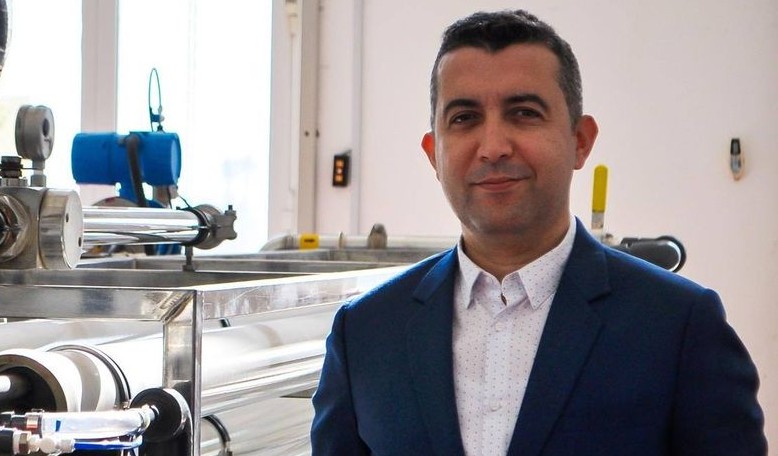Mustafa(Pbuh) Prize: Great incentive for scientists
Director of Water Energy Climate Experts Network (WECEN) stressing that the Islamic world desperately needs creative and prominent scientists, pointed to the Mustafa(Pbuh) Prize as an impressive stride that offers scientists and researchers a strong incentive.
MSTF Media reports:
Jauad El Kharraz, Director of Water Energy Climate Experts Network (WECEN) in France, in an interview with the Mustafa
Science and Technology Foundation (MSTF) pointed out the importance of the Mustafa
Prize stating that such an award is undoubtedly a beautiful move that can motivate scientists and researchers of the Islamic world to conduct groundbreaking research, propose innovative solutions, and develop new technologies. This leads to scientific initiatives and increases the scientific quality of human knowledge, especially that of the Islamic world which is in dire need of eminent and creative scientists, he said.
He touched upon the great financial reward of the Mustafa
Prize emphasizing that the cash award gives more credit to the Mustafa
Prize because it helps researchers and scientists release their inventions or innovations, break their scientific research into world markets, or organize their laboratories and research teams.
“However, the spiritual value of this award is much greater because the name of the award’s recipient will be carved on the body of world’s scientific community forever. Accordingly, the Mustafa
Prize will become a global reference in the future, on which they will model,” El Kharraz added.
Referring to the invaluable opportunity that the Mustafa
Prize and the Science and Technology Exchange Program (STEP) meetings create for scientists and innovators, El Kharraz, as a participant of the 6th STEP, highlighted the significance of developing scientific cooperation between scientists and innovators in the Islamic world.
“Muslim scientists collaborate mostly with European and American scientists and it rarely happens that scientists in the Islamic world sit for a scientific exchange of ideas,” he said.
El Kharraz noted that scientists in the Islamic world should seize this opportunity and create specialized teams in various scientific fields to help Islamic countries.
“Islamic countries will wither if they do not conduct scientific research; therefore, we must invest in carrying out such research, strengthen scientific cooperation among ourselves, create resources and incentives for doing research, and position scientists next to decision makers, at least as consultants,” he continued.
Referring to the problems that hinder the growth of the Islamic world, he stated “The migration of Muslim elites is a pressing problem and will undoubtedly cause great damage to the Islamic world, because it only serves the host countries that accept them with open arms. The mother lands of these elites would not benefit from their own children; therefore, their homelands will continue to lag behind in science.”
He praised the Mustafa
Prize for generating high motivation, saying “This cash award is not enough to halt the wave of countries’ educated elite emigration. The Mustafa
Prize should also take other effective measures such as persuading decision makers to increase research funds, paying closer attention to the academic staff of universities, providing a research environment for scientists and researchers similar to those in European and American countries in terms of enjoying well-equipped laboratories and straightforward administrative procedures, and providing scientists with bonus payments, prizes, and other long-term incentives.”
El Kharraz also put forward a number of suggestions for promoting scientific research in the Islamic world, parallel to national and international awards, including raising funds for scientific research; encouraging partnerships between universities, research institutes, and the private sector, e.g. industrial companies; and enhancing cooperation among various research institutions in the Islamic world as well as leading research institutions in Europe, the United States, and Asia.
Talking about scientific research, he stated that “we should have a consistent mechanism which aims to promote the scientific status of researchers and university professors based on the quality of scientific research, not its quantity. It must also be based on the value of scientific products and practical applications and investment in innovative projects which address national needs and fundamental problems in areas of water and energy, health, transportation, and agriculture.”
“All of these should be part of a national and regional strategy for the advancement of scientific research with precise mechanisms and specific criteria, supervised by special committees, who will distribute financial and budgetary grants among researchers for scientific research,” he continued.
According to El Kharraz, cooperation among the Islamic countries, particularly in scientific research, is still restricted and is by no means at the level of the cooperation between researchers of the Islamic world and their counterparts in Western countries.
“Opportunities to develop these collaborations can be enhanced by signing agreements on mutual cooperation and scientific exchanges along with initiating programs similar to those being implemented in Europe,” he said.
Rejecting the reasons suggested by some for the decline of scientific research and studies in the Islamic world, El Kharraz noted that the biggest reason is the stagnation that occurred in the Islamic world centuries ago when the sciences had been restricted to religious studies. At that time, any thinker who proposed new ideas would be vigorously challenged and suppressed. Averroes’s books, which had been translated into different languages in Europe in thousands of copies, were burned to ashes.
As El Kharraz put it, the ruling regimes created societies that recoiled at thinking, initiative, or innovation in a way that led to the backwardness and underdevelopment of the Islamic world. Simultaneously, progress and development were accelerated in the European countries who embarked on inventing almost everything new from the 17th century. “They abused and exploited our countries and subjugated us to be obedient to them intellectually, scientifically, economically, and even politically,” he maintained.
“The Islamic world cannot restore its glory days unless it traces progress in scientific research, innovation, and open-mindedness,” El Kharraz asserted.
The Mustafa
Science and Technology Foundation (MSTF) holds the Mustafa
Prize Award Ceremony biennially, aiming to introduce and honor the prominent researchers and scientists of the Islamic world and hold them up as inspiring examples in Islamic communities.

